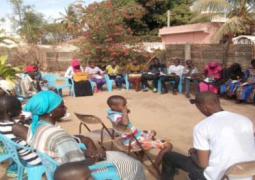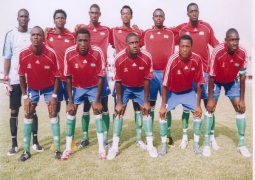Development workers from different walks of life gathered on Monday at the TANGO conference hall to discuss among others the challenges on issues of gender and poverty.
The panelists were Dr Kujejatou Manneh, Director of Actionaid International The Gambia; Mrs Amie Bojang-Sissoho, Programme Coordinator of the Gambia Committee on Harmful Traditional Practices (Gamcotrap), and Mam Samba Joof from Agency for the Development of Women and Children (ADWAC).
Speaking at the forum, Dr Kujejatou Manneh spoke on the topic “Analysis of Human Rights-based approaches to ending inequality in society and the powerlessness of women and Girls”.
According to her, development for women did become a concern when people discovered the differences between men and women’s access to resources and facilities in development projects and programmes.
“In the analysis of gender/women and poverty in The Gambia, we need to pay attention to the defined roles and responsibilities for women and men in this culture and how Gender and Development or Women and Development can best help to address the situation,” she said.
Dr Manneh revealed that the principle of equality and non-discrimination requires that all persons within a society enjoy equal access to the available goods and services that are necessary to fulfil basic human needs.
She indicated that for a rights-based approach the principle of equality and non-discrimination implies that the development effort should target excluded groups that may, for instance, have inadequate access to social services.
These groups may be discriminated against by state policies and practices and/or cultural practices, or, in other ways, enjoy less economic, social, cultural, political and civil rights than others, she added.
On the analysis of approaches to human rights, Dr Manneh said that a rights-based approach to development describes situations not simply in terms of human needs, or of development requirements, but in terms of society’s obligations to respond to the inalienable rights of individuals, empowers people to demand justice as a right, not a charity and gives communities a moral basis from which to claim international assistance when needed.
However, “poverty is more than lack of resources,” she noted, adding that it is the manifestation of exclusion and powerlessness.
“In this context, the realization of human rights and the process of development are not distinct and on the contrary, development becomes a sub-set of the process of fulfilling human rights,” said Dr Manneh.
She said ActionAid believes that the root cause of poverty is unjust distribution of economic, political or social power resulting in oppressive structures at local, national and international levels.
Mrs. Manneh added that Communities need to build alliances and work together on focused campaigns to secure changes to existing power structures by overcoming unjust power structures.
Amie Bojang-Sissoho also diluted on “Analysis of the linkages between traditions and the self-esteem and the impact on women’s politics and economical empowerment”.
She further made a close look at traditional perceptions about women’s empowerment, practices and realities of women’s economic empowerment, among others.
Mrs. Bojang noted that economically empowered women contribute immensely to the upkeep of the family and education of their children.
She emphasised the need to understand that women as citizens have equal rights as men to participate in economic and political activities.
The rights activist emphasised that women should be perceived as partners in development both in the private and public spheres.
Mam Samba Joof also made some remarks on the topic: “Women empowerment and capacity building and access to productive resources”.
At the end of the debate, participants pointed out the need for evidence-based researches on issues affecting the empowerment and promotion of women’s’ rights, skills training and capacity building, mainstreaming gender in all development policies and programmes, among others.




